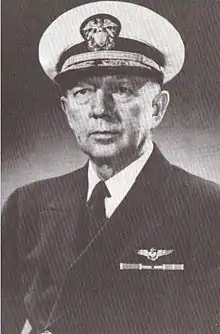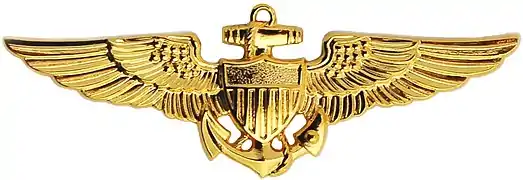Donald B. Duncan
Donald Bradley Duncan (1896–1975) was an admiral in the United States Navy, who played an important role in aircraft-carrier operations during World War II.
- This is about the American naval officer. For others, see Donald Duncan (disambiguation).
Donald B. Duncan | |
|---|---|
 | |
| Nickname(s) | "Woo" |
| Born | September 1, 1896 Alpena, Michigan |
| Died | September 8, 1975 (aged 79) Pensacola, Florida |
| Allegiance | |
| Service/ | |
| Years of service | 1917-1956 |
| Rank | |
| Commands held | 2nd Task Fleet USS Long Island USS Essex |
| Battles/wars | World War II |
| Awards | Legion of Merit |
Duncan graduated from the United States Naval Academy in 1917, and was assigned to the USS Oklahoma (BB-37). He received a master's degree in radio engineering from Harvard University in 1925.
In 1941, he was the first commander of the USS Long Island, the Navy's first escort aircraft carrier.
As the air operations officer to Admiral Ernest J. King, Duncan assisted with the planning for the Doolittle Raid, and was the one who proposed the use of both the B-25 Mitchell bombers and the Hornet (CV-8) for the raid. He was then appointed to be the first commanding officer of the carrier Essex (CV-9).
Duncan held several important staff and operational positions following the war. He served as Deputy Chief of Naval Operations (Air) from March 6, 1947 to January 20, 1948. He commanded the 2nd Task Fleet after 1948, and was the Vice Chief of Naval Operations from 1951 to 1956.
Following his retirement from the navy on March 1, 1957, he served as Governor of the Naval Home until May 1962. He died on September 8, 1975.
Awards
 Naval Aviator insignia
Naval Aviator insignia Legion of Merit
Legion of Merit- Navy Presidential Unit Citation with one bronze service star


 National Defense Service Medal
National Defense Service Medal
_Ribbon.png.webp) Order of the British Empire, Military Division
Order of the British Empire, Military Division
